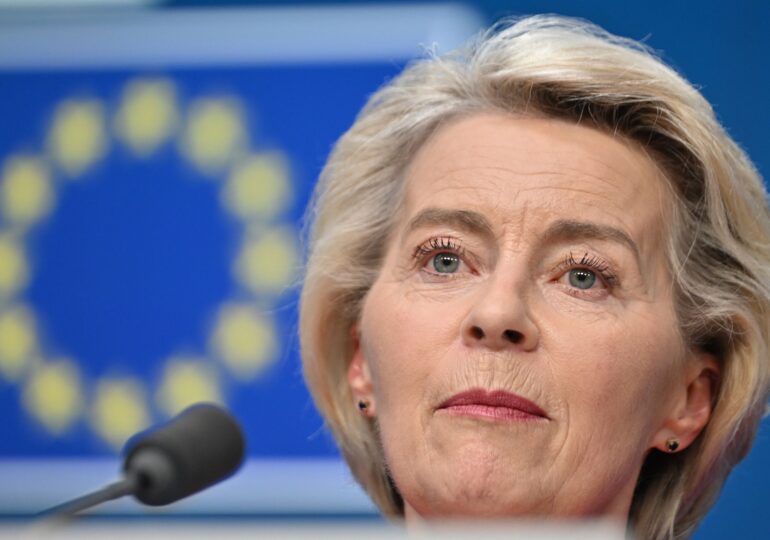The President of the European Commission, Ursula von der Leyen, presented on Wednesday the new budget project of the European Union for the period 2028-2034, worth nearly 2 trillion euros, calling it a „budget for a new era.”
According to the President of the European Commission, it is a historic budget, the most ambitious ever proposed, more flexible, more transparent, as reported by Reuters.
"It is a budget for a new era, which corresponds to Europe's ambitions. Which responds to Europe's challenges. Which strengthens our independence," wrote Ursula von der Leyen on the X network.
She emphasized that the plan proposes a change in how the EU raises key funds and sent a clear message regarding the link between EU funds and the rule of law.
"Respect for the rule of law is unconditional. The rule of law is a necessity for all EU budget funding. With the next Multiannual Financial Framework (MFF), we will move forward. National plans for regional partnership will make the rule of law and fundamental rights a condition for investments and a central point for reforms. The rule of law applies to all funds and will be a smart conditionality," underlined Von der Leyen.
The proposal aims to triple the budget for migration and border management and double the funds for the Horizon research program, while 35% of the budget is expected to be spent on climate and biodiversity.
"131 billion euros will go towards defense and space, 5 times more than we currently have," added Ursula von der Leyen.
However, one of the most visible changes in von der Leyen's proposal is the merger of the two major budget packages: the Common Agricultural Policy (CAP), which includes subsidies for farmers, and the cohesion funds.
Ursula von der Leyen stated that 865 billion euros will be allocated for agriculture, fisheries, cohesion policy, and social policy (funds that have been merged into a single chapter but with substantial reductions compared to the previous budget).
The direct contributions of the member states will cover the majority of the budget. Ursula von der Leyen specified, however, that she foresees the introduction of new taxes valid throughout the entire European Union, such as those on electronic waste, tobacco, and corporate profits, for additional own resources.
These measures are expected to bring in approximately 58.2 billion euros per year but require the unanimous agreement of all 27 member states.
Siegfried Mureşan: We will not accept agriculture and cohesion to lose importance
Member of the European Parliament Siegfried Mureșan (EPP / PNL), the chief negotiator of the European Parliament for the future Multiannual Budget of the European Union 2028–2034, immediately reacted after the official presentation of the multiannual budget proposal by the European Commission.
"The European Parliament supports that defense and competitiveness should be new priorities in the future Multiannual Budget of the European Union. However, we will not accept agriculture and cohesion to lose importance. The new priorities must be supported with new resources, not to the detriment of traditional priorities," stated European Parliament member Siegfried Mureșan.
According to him, the Parliament will insist that traditional policies – cohesion and agriculture – be adequately funded, at least at the current level, adjusted for inflation.
"We will reject any budget that does not guarantee the protection of allocations dedicated to both the Common Agricultural Policy and the Cohesion Policy or where our farmers have to compete with regions for the same European funds," said Siegfried Mureșan.
In its multiannual budget presentation, the European Commission proposed including cohesion and agriculture funds in a single national plan for each member state. With this proposal, there is a risk that funding for cohesion and agriculture will compete with other funds and there will no longer be a European approach to agriculture and cohesion.
"Romania and Romanian farmers should not pay for reforms delayed by authorities in other areas. The European budget must continue to provide stable and predictable support where it matters most for citizens," added Mureșan.
"The Commission proposes centralization. We demand clarity, visibility, and concrete results in every European region. We will thoroughly evaluate the legal basis proposed today by the Commission, but one thing is clear: agriculture and cohesion are not up for negotiation. They must remain priorities in the future Multiannual Budget of the European Union," emphasized the chief negotiator.
What's Next
With today's presentation, the official negotiation procedure between the European Commission, the Council of the European Union, and the European Parliament on the future Multiannual Budget of the European Union 2028–2034 has officially begun.
As a legislative and budgetary institution, the European Parliament has the right to reject the budget proposal if it deems it unsuitable for European priorities and needs.

